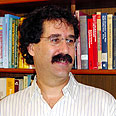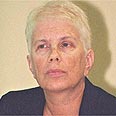


Economists: Education Israel's home-grown danger
Jewish pupils who attend haredi schools can recite chapter and verse of Bible, but most can't spell in English. Meanwhile, would-be new member of club of rich countries has the highest poverty rate of any OECD country. 'The threat we are facing, the existential threat, is not external. It's internal,' says Daniel Ben-David of Tel Aviv University
Threats to Israel typically come in the form of rockets. But economists also see a profound risk to the State that is entirely within its control: Its education system.
Inside a modern economy renowned for its innovative high-tech sector, they see a growing problem. Critics say the Jewish pupils who attend ultra-Orthodox schools can recite chapter and verse of the Bible, but most can't spell the name of their largest Arab neighbor, Egypt, in English.
About half of Israel's pupils either attend Arab schools that are under-funded, or ultra-Orthodox Jewish seminaries where "secular" subjects such as English, science and mathematics take a back seat to biblical studies, or are completely ignored.
It's a far-from-typical profile for a developed member of the Organization for Economic Co-operation and Development (OECD), which Israel hopes to join formally in May.
"The threat we are facing, the existential threat, is not external. It's internal," said Daniel Ben-David of Tel Aviv University. "It's not even Arab versus Jew. It's a completely social problem."
It's also one of the most intractable. Senior Israeli officials have long acknowledged the need for reform, there have been inquiries and public anger, but no government has yet had the political will to grasp the nettle.
"The socio-economic chasm between the general Jewish population and the two large minority groups is widening," the OECD said in a report last month.
It's a situation rooted in complex attitudes to Israel's two fastest-growing minorities: Israeli Arabs and ultra-Orthodox Jews, known in Hebrew as "haredim", who dress in distinctive black garb. Both groups generally live in separate communities – in haredi areas, roads are blocked to cars during the Sabbath and Jewish holidays – and neither typically serve in the Israeli army, which earns some resentment among the majority.
Also the youngest population group, they are projected to increase to half of Israelis in a generation, from 30% now. Both have high rates of poverty and non-employment, which means they are not only out of work, but aren't seeking it.
The problem is manifest in international tests. All Israeli teenagers rank close to the bottom, at about 90% of the OECD average. Arab students have the lowest scores of all at just above 75% of the OECD average – and ultra-Orthodox Jewish pupils do not participate in the "secular" tests at all.
This is also hardly the level of enlightenment that could be relied on to build the understanding so sorely needed for peace in the Middle East between Palestinian, Arab and Jew.
Brain drain
An exception which proves the rule is the Nahardea school in Nehalim near Tel Aviv, where ultra-Orthodox pupils learn all the core subjects in the national curriculum as well as biblical studies: "Our goal is to give the Haredim a chance to become integrated into the Israeli labor market without having to give up their religious identity," said educator Hanosh Verdiger.
"Everything is possible," said 15-year-old pupil Idan. "I'd either become a rabbi or an engineer. I haven't decided yet," he added, walking from the on-campus synagogue to a science class.
But there are only five schools like this in Israel.
And incentives to find such work are thin on the ground. The high-tech industry accounts for about 43% of exports but employs only 7% of the workforce. Only one in four haredi men has a job: the rest are engaged in full-time biblical studies, the OECD said.
The Arab minority shares the haredim's immediate causes of poverty: large families and low employment. And the evidence suggests public spending on education per child in Arab localities is about one-third lower than in predominantly Jewish municipalities, according to the OECD.
Ben-David pointed out that if a large part of Israel's potential workforce remains sidelined or under-utilized, the economy's decline will lead to a brain drain, starting a vicious cycle of lower living standards.
It's a process already in evidence.
Israel has the highest non-employment rate among 30 OECD countries, according to the OECD: 40% of Israelis aged between 15 and 64 do not work, versus an OECD average of 33%. Research conducted two years ago by economists at the Hebrew University in Jerusalem found that Israelis with a bachelor's degree or higher are 2.5 times more likely to emigrate than those with less education.
Politics as usual
Technically, the problem is also entrenched in Israel's parliament where the politics of interests prevail.
The main parties never win enough seats to rule alone, relying on smaller parties that can make or break governments, such as the ultra-Orthodox parties Shas and United Torah Judaism, which oppose state interference in their schools.
And ultra-Orthodox parties usually make participation in any government coalition conditional on guarantees of funding for their schools and social causes, which perpetuates the educational bias towards the biblical.
Prime Minister Benjamin Netanyahu's Likud party would risk the end of his coalition if he pushed for reform that alienated its Shas and United Torah Judaism partners. Likud last year agreed an increase of NIS 1.4 billion ($376 billion) in child welfare funding over three years and an undisclosed budget boost for Haredi schools, in return for their participation.
Arab Israelis have long complained of under-funding and discrimination in the labour market, but their parties refuse to join governing coalitions led by Zionist parties: Israel says only political participation can secure equal rights and funding for their constituents.
"Tackling the causes of such entrenched and wide inequalities as exist in Israel will not be easy," the OECD said. "It will require a sustained effort across a broad range of policy areas."
Old chestnut
Under a previous Likud government six years ago, a state inquiry was launched after a wave of public anger at the bad state of education. Then, a series of cuts had shrunk the education budget by 5% between 1999 and 2004, as the number of pupils grew by 18%.
Known as the Dovrat Commission, it recommended raising teacher pay, attracting more qualified professionals, encouraging competition among schools, providing extra assistance for deprived children and enforcing a unified national curriculum to teach core subjects to all pupils.
"The technical recommendations of the Dovrat Commission were not implemented partly because of lack of funding," said Barbara Swirski of the Adva Center in Tel Aviv, which provides information on equality and social justice in Israel.
"Its main recommendation – that a single national curriculum must be taught to all children, regardless of race, religion or social background – was ignored," she added.
Meanwhile, the would-be new member of the club of rich countries has the highest poverty rate of any OECD country, and 60% of its poor are Arabs and haredim.
"If we don't do something today to give them a much better education and make them a central part of Israeli society, in 20 to 30 years we are going to have a major problem here," said Ben-David. "It's unsustainable."















